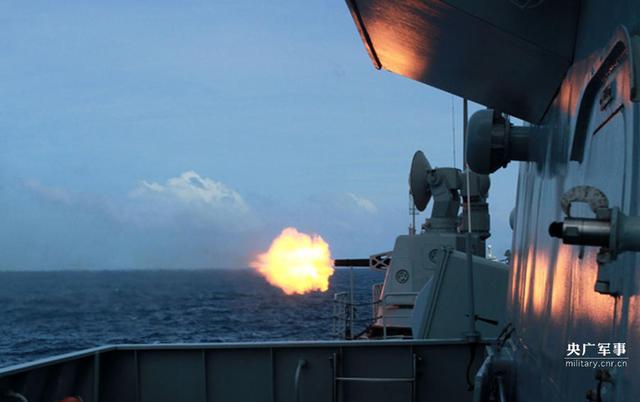

Military cooperation between China and Russia is not the next NATO

Russian and Chinese warships kicked off the active naval stage of the Maritime Cooperation 2017 drills on July 25 in the Baltic Sea—the heart of Europe, shaking the West’s sense of security.
Three Chinese Navy ships—the Hefei guided missile destroyer, the Yuncheng frigate, and the Luomahu supply ship—appeared in the Baltic Sea for the kick off the routine joint drills, becoming the first Chinese naval group to pay a visit to the Baltic Sea. The series of drills are expected to last until July 28, and will include anti-ship, anti-submarine, and anti-aircraft defense maneuvers. China and Russia have been holding the joint naval drills since 2012.
Piers Cazalet, the acting spokesman for NATO, said that the naval drills in the Baltic Sea “are an example of China’s growing military capabilities and its increasingly significant global role,” The New York Times reported.
The joint naval drills in the Baltic Sea are rattling the nerves of the Western powers. However, the Chinese government has made it clear that the drills are not aimed at any third party, which, by definition, includes NATO. In addition, China does not have a ruthless history of colonialism.
But it is hard for the Western powers to shake off that old thinking of world domination. “The Baltic Sea is the heart of Europe. One can only imagine how uncomfortable the China-Russia military exercise is making them,” said Xiakedao, the WeChat account of the overseas edition of the People’s Daily.
The West’s anxiety over the joint naval drills is evident from their “little tricks,” as noted by Xiakedao. The former world power dispatched its Royal Navy to shadow the high-tech Chinese armada through the English Channel on its way to join Russia’s fleet. This is routine business for the United Kingdom, but the Netherlands and Denmark also dispatched warships.
NATO countries are worried about the growing strategic partnership between China and Russia and the joint naval exercises are being watched closely by NATO warships in the area. The U.S. European Command (EUCOM) said in a statement that the U.S. is “closely tracking Russian exercises with other participants, like China,” according to Stars and Stripes, a news organization that provides news and information to the U.S. military community.
The hysteria is ridiculous. In total, about 10 ships, including the three Chinese warships, are taking part in the joint military exercises. In addition, it took the Chinese warships 40 days to reach the distant frontier, according to Russian news agency Sputnik. Compare that to the scale and frequency of NATO military exercises at Russia’s doorstep or the scale and frequency of U.S military exercises at China’s doorstep, and it is obvious that the naval drills are trivial in comparison. “There is no need for NATO to be so fragile,” said Xiakedao.
Members of NATO ought to be extremely uneasy—but for very different reasons. U.S. President Donald Trump has called into question the “enduring purpose and nature” of the military and political organization and demanded members pay the U.S. for “protection,” which is problem for the European countries that are struggling with slow to no growth. Furthermore, the new administration is basically just sharpening the edge of former U.S. President Barack Obama’s failed “rebalance to Asia and the Pacific” policy by putting more emphasis on the military dimension. Clearly the U.S.’s “rock-solid” commitment to the alliance is in question.
The truth of the matter regarding the joint naval drills is much more mundane. While China and Russia are forging closer military ties, they are not forming a formal military alliance to engage in expansion or to defend against the potential threat of aggression. China has been very clear that it has no intention to seek expansion. And although China is rising as the West declines, the country is focused on development and cooperation—and not world domination. As for Russia, the most important task is to build up the economy. What this all means, of course, is that routine military cooperation between China and Russia is not the next NATO.
 Fire brigade in Shanghai holds group wedding
Fire brigade in Shanghai holds group wedding Tourists enjoy ice sculptures in Datan Town, north China
Tourists enjoy ice sculptures in Datan Town, north China Sunset scenery of Dayan Pagoda in Xi'an
Sunset scenery of Dayan Pagoda in Xi'an Tourists have fun at scenic spot in Nanlong Town, NW China
Tourists have fun at scenic spot in Nanlong Town, NW China Harbin attracts tourists by making best use of ice in winter
Harbin attracts tourists by making best use of ice in winter In pics: FIS Alpine Ski Women's World Cup Slalom
In pics: FIS Alpine Ski Women's World Cup Slalom Black-necked cranes rest at reservoir in Lhunzhub County, Lhasa
Black-necked cranes rest at reservoir in Lhunzhub County, Lhasa China's FAST telescope will be available to foreign scientists in April
China's FAST telescope will be available to foreign scientists in April "She power" plays indispensable role in poverty alleviation
"She power" plays indispensable role in poverty alleviation Top 10 world news events of People's Daily in 2020
Top 10 world news events of People's Daily in 2020 Top 10 China news events of People's Daily in 2020
Top 10 China news events of People's Daily in 2020 Top 10 media buzzwords of 2020
Top 10 media buzzwords of 2020 Year-ender:10 major tourism stories of 2020
Year-ender:10 major tourism stories of 2020 No interference in Venezuelan issues
No interference in Venezuelan issues
 Biz prepares for trade spat
Biz prepares for trade spat
 Broadcasting Continent
Broadcasting Continent Australia wins Chinese CEOs as US loses
Australia wins Chinese CEOs as US loses